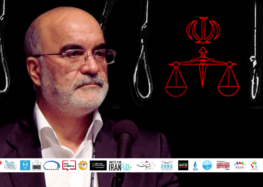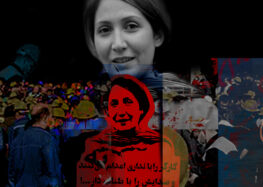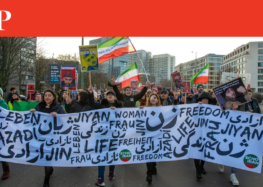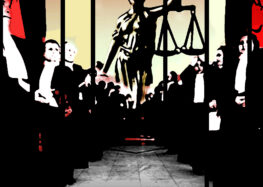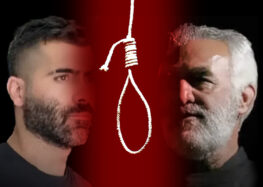Dozens Called “Thugs” Arrested In Tehran And Other Cities; Rushed Death Sentences For Tehran Robbery Suspects
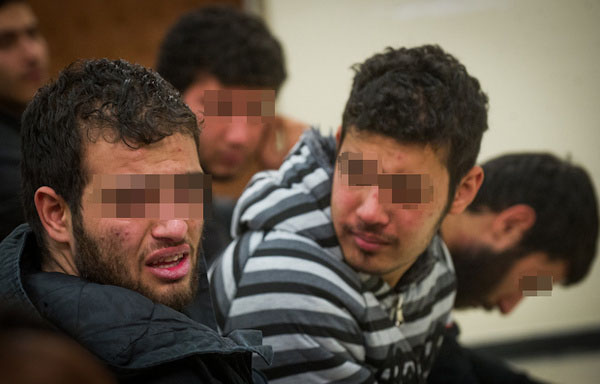
Several days after the three-minute video was widely published, Sadegh Amoli Larijani, Head of the Iranian Judiciary, announced that according to Sharia and existing laws, there is no difference whether the perpetrators used warm or cold weapons, and that the ruling in the case is moharebeh [enmity with God], and the punishment is death by execution.
The widespread distribution of the short film of the assault in Iranian media and YouTube once again highlighted the issue of security and street violence in Tehran. But Commander Esmaeel Ahmadi Moghaddam, Iran’s Chief of Police, said at a conference a few days after the video surfaced that he has no knowledge of the incident. He said that he is not informed of all the robberies that take place in the capital, but if a reporter informs him of the incident, he would follow up on it.
Several days after the three-minute video was widely published, Sadegh Amoli Larijani, Head of the Iranian Judiciary, announced that according to Sharia and existing laws, there is no difference whether the perpetrators used warm or cold weapons, and that the ruling in the case is moharebeh [enmity with God], and the punishment is death by execution.
Referring to punishments other than execution for crimes involving use of a cold weapon, Amoli Larijani said, “Of course there are other, alternative, punishments in this area, but the Judiciary chose the death punishment based on the need to act assertively and to increase the cost of committing thuggery.”
In expressing his opinion about a death sentence for the suspects in this case, the Head of the Judiciary indeed issued his opinion before a court had convened in the case and a trial had been held to review the charges.
Following opinions expressed by the Head of the Judiciary, the Tehran Prosecutor also appeared on Iran’s state television on December 15, 2012, and stated that he would do whatever he can to submit the case to the court over the next 10 days. About investigations about the suspects, the Prosecutor only said, “All four suspects in this case are young, come from broken homes, have prior records, and were unemployed.”
The suspects were put on trial at Branch 15 of Tehran Revolutionary Court under Judge Abolghasem Salavati on January 2. Two of the suspects were sentenced to death and the other two were sentenced to 10 years in prison, 5 years in exile, and 74 lashes each. Judge Salavati is the judge who tried most of the political and conscience activists after the 2009 presidential election.
According to the Islamic Penal Code, punishment for the use of a cold weapon during a robbery is from three to twenty months in prison and 74 lashes. However, if the armed robber threatens public security and causes fear and intimidation, he is considered a mohareb, enemy of God, and his punishment is execution. The surveillance video shows one of the perpetrators yelling at passersby and drivers of other cars to leave the scene.
Only one month after the arrests, the interrogations, and investigations, the four men’s court trial was held and their rulings were issued. The hurriedly-issued death sentences on the pretext of calming down public opinion and warning other criminals will not have an impact on the rising rate of crimes in Iran. Over the recent years, several dangerous criminals have been executed immediately after arrest, but this has not curbed the occurrence rate of violent crimes.
The Head of the Iranian Judiciary additionally asked the Police force to commence a new round of crackdowns on “thugs” after this incident. During the recent days, there has been news of the arrests of 35 individuals as “thugs and hoodlums” in the city of Qom and 11 individuals in the city of Ilam. It is not clear on what legal and judicial charges the men were arrested. The only thing reflected in the news about the arrests indicates that the suspects “disrupted public order through creating fear and intimidation.” Commander Ahmad Radan, Deputy Tehran Police Chief, also announced that a new round of crackdowns on thugs has started in Tehran. According to this security official, between the evening of Monday, December 24, 2012, and Tuesday, December 25, many “thugs” were arrested. The actual charges of the suspects and their current detention locations have not been disclosed.


